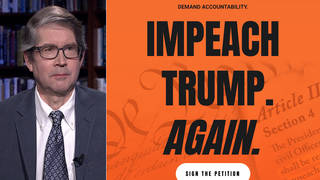As the political impasse drags on, affected federal workers and agencies continue to call for an end to the shutdown. The Transportation Security Administration said a record 10 percent of workers did not come to work Sunday due to the shutdown, as travelers face extended wait times and reduced service at a number of airports around the country. There are over 800,000 federal workers who are working without pay or on furlough, and 4 million federal contractors who will never be paid, perhaps, because they’re not working directly for the government though are affected by the shutdown.
A group representing the FBI released a report Tuesday laying out the effects of the shutdown on the agency, including hampering ongoing criminal investigations and cases involving sex trafficking and crimes against children.
Federal workers affected by the shutdown are continuing to hold events and rallies across the country. This is Lorie McCann, an employee at the Internal Revenue Service in Chicago who recently filed for unemployment.
Lorie McCann: “So, I’m going through physical therapy, and the co-pays are $90 a week, and so I’m having to pay that out of pocket. So now it’s at the point—well, I did get to the point where: Should I go to physical therapy or pay a bill or purchase food?”
Food banks have been set up around the country to help federal workers who can’t afford food.










